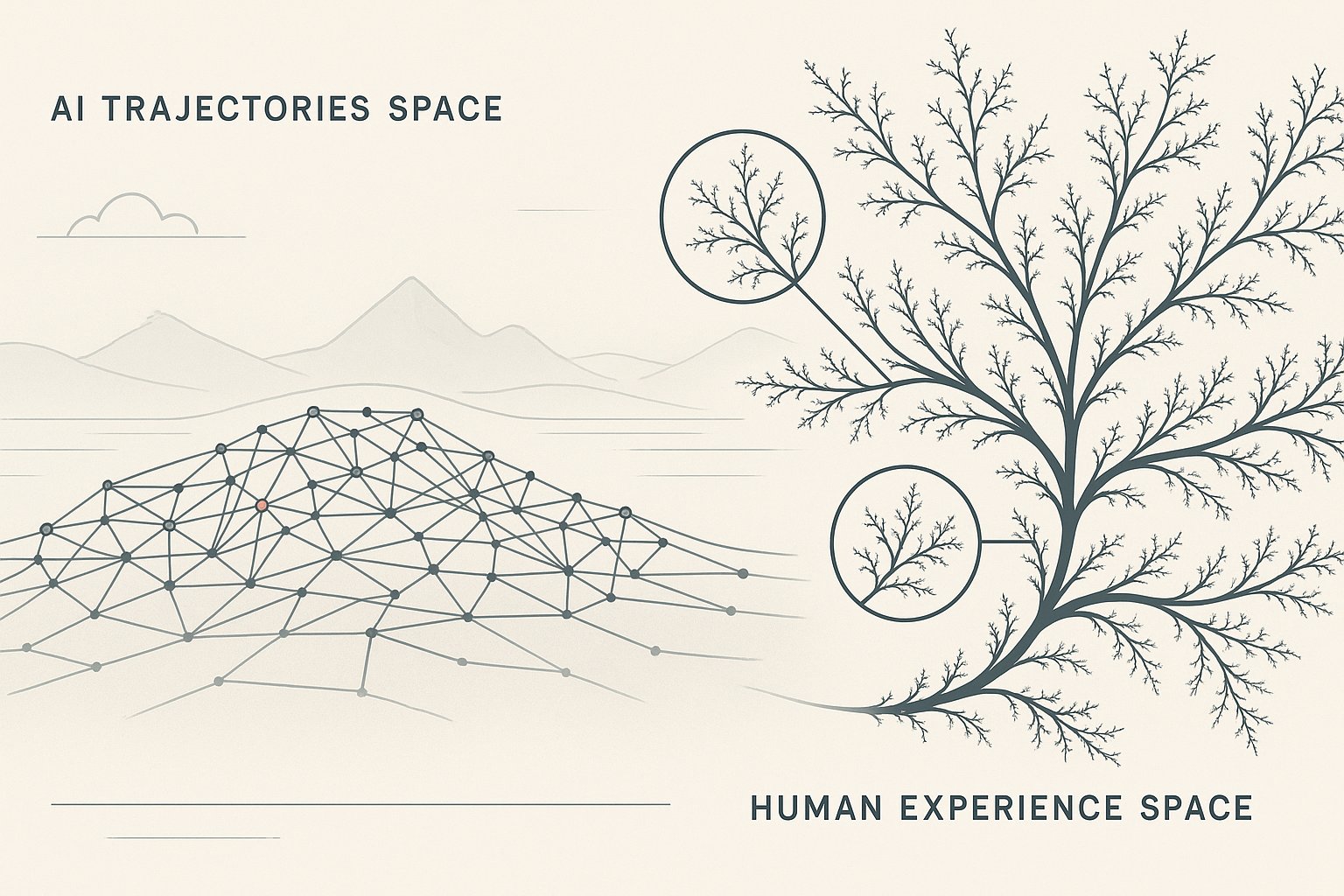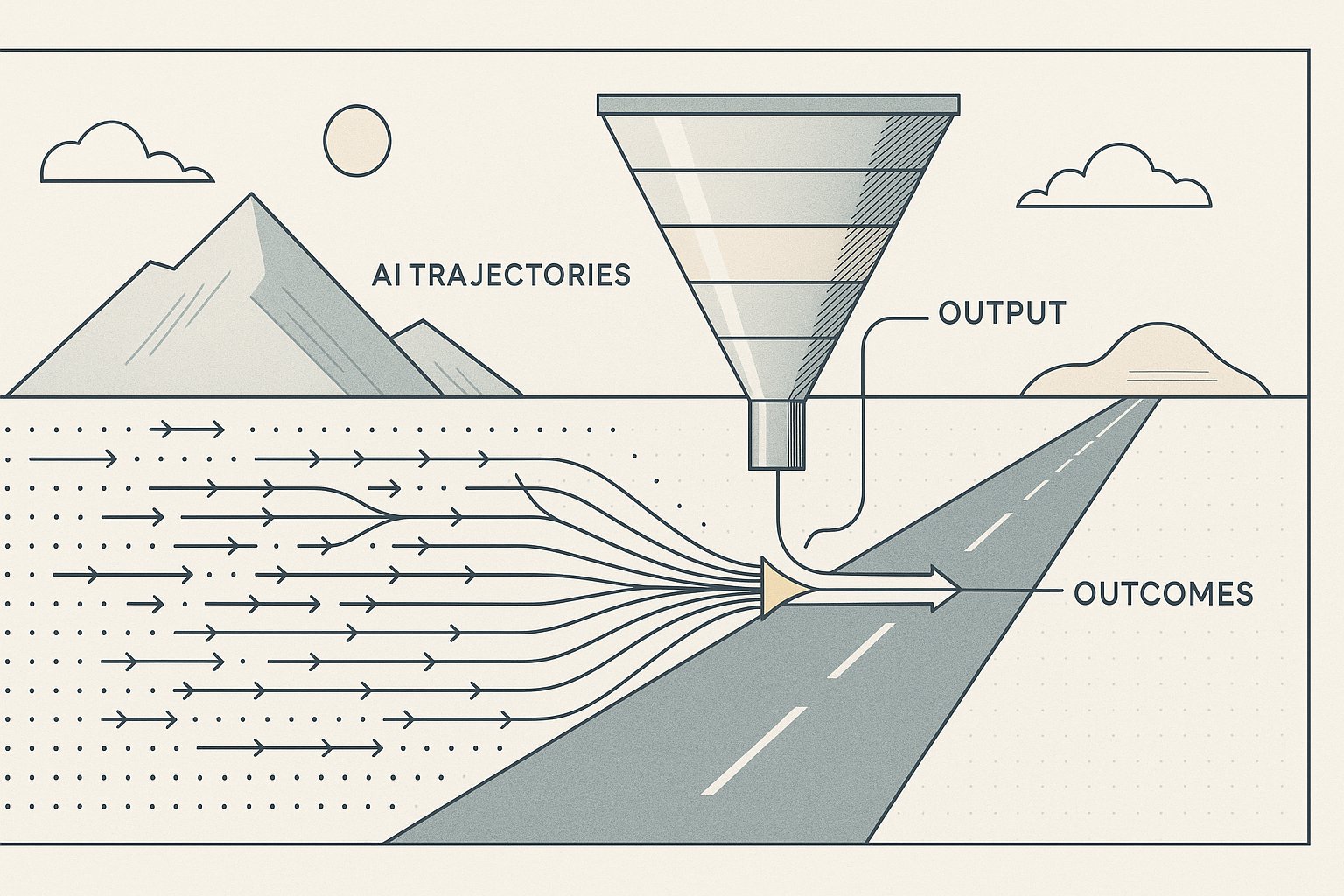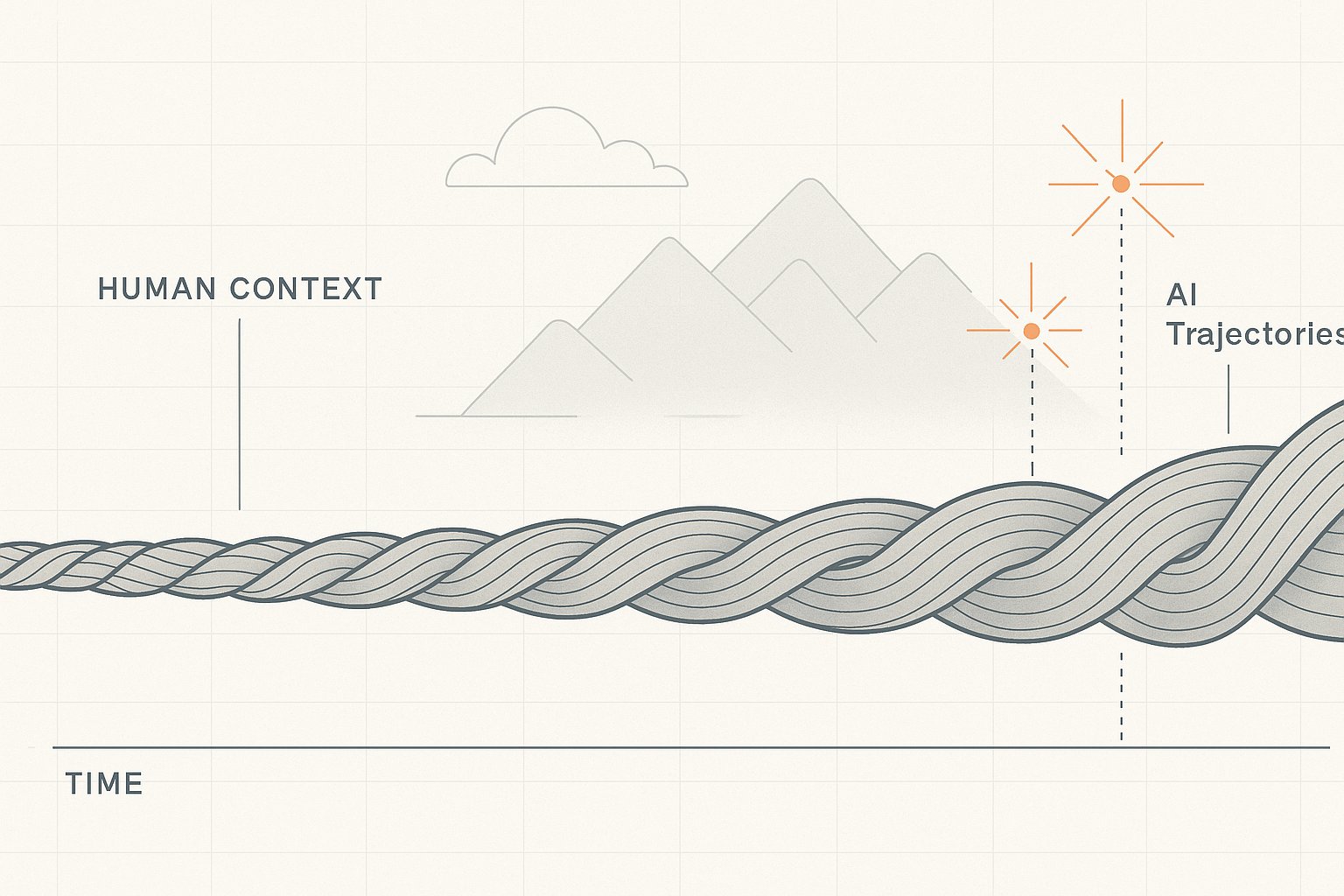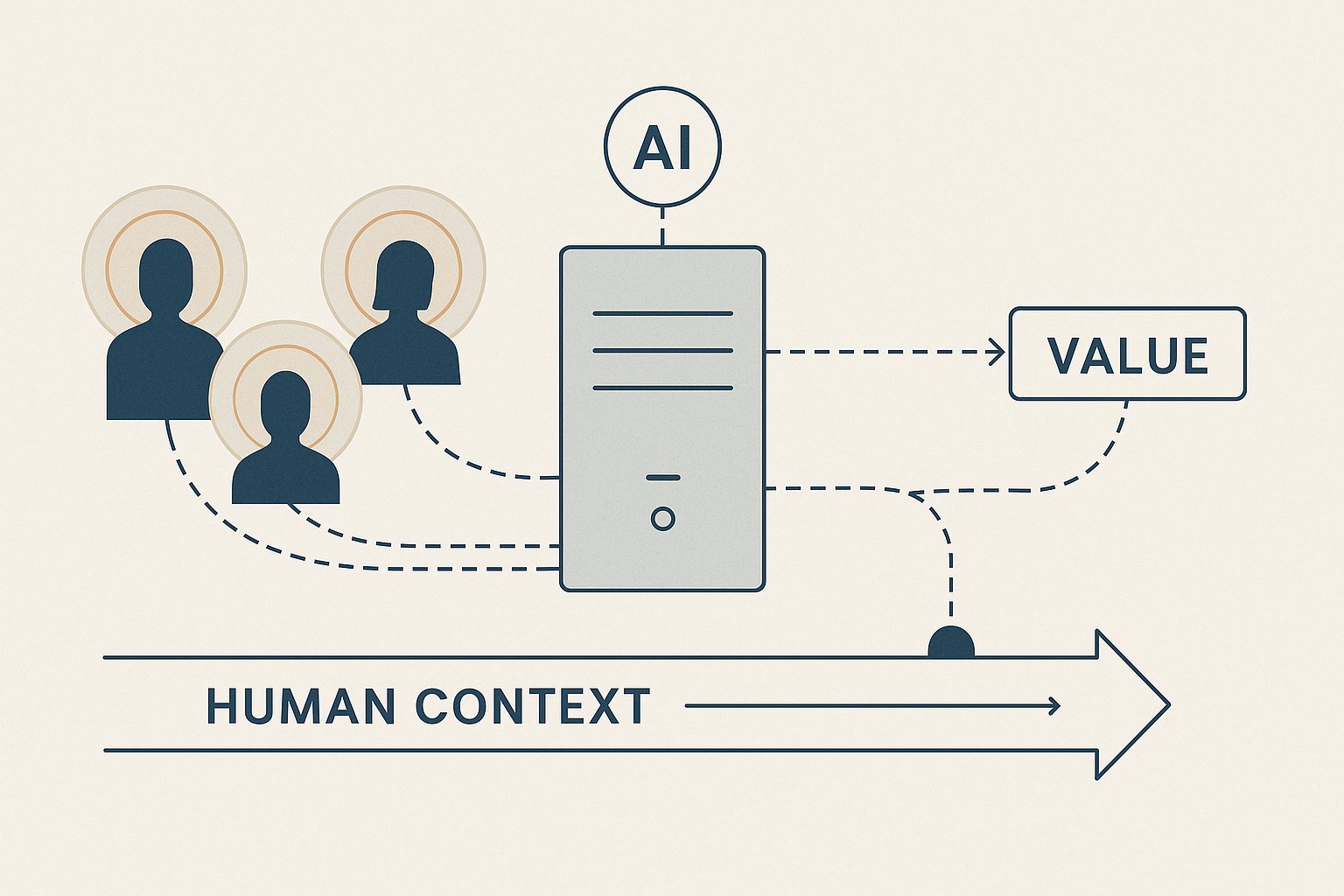The Economics of Context
Context operates as capital in the interaction between humans and AI systems. Each human brings an irreplaceable subjective position—a unique trajectory through experiential space that has never existed before and will never exist again. This trajectory carries information that cannot be derived from any other source: the specific history of choices, constraints, and perspectives that constitute an individual human life. When this context couples with an AI system's crystallized patterns, it selects from the vast space of possible outputs exactly those that matter for this particular situation.
The mathematics of rarity make this clear. As The Many Claudes Interpretation demonstrates, the combinatorial space of possible AI trajectories is astronomical—more unique paths than atoms in the universe. But the space of human trajectories dwarfs even this. A human navigates not just linguistic possibility but embodied experience across decades, accumulating context through billions of micro-decisions, sensory experiences, and social interactions. Each human trajectory traces a path through experiential space whose complexity exceeds what any current AI system can generate or access.

Selection Through Subjective Coupling
What actually happens when human context meets AI capability is selective activation of possibility space. The AI system contains crystallized patterns from millions of human trajectories, compressed into geometric relationships as described in The Trinity of Infinity. These patterns exist in superposition—multiple potential outputs coexisting in the same mathematical structure. Human context collapses this superposition, selecting exactly those geometric paths that resonate with the current situation.
This selection mechanism operates through what The Interface Problem identifies as asymmetric coupling. The human brings fresh subjectivity—the ability to recognize which outputs matter, which directions to pursue, which connections have value in this specific context. The AI brings vast navigational capability through meaningspace but cannot independently determine which regions to explore. The human's contextual knowledge acts as a navigation function, directing the AI's geometric operations toward outputs that could only be valuable given this particular configuration of needs, constraints, and goals.
The coupling creates value that neither party could generate alone. The human cannot navigate the high-dimensional spaces where semantic relationships exist as geometric patterns. The AI cannot determine which patterns matter for this unique situation. Together, they access regions of meaningspace that become valuable precisely because human context selected them from infinite alternatives.

Local Knowledge and Distributed Context
Context functions as local knowledge in Hayek's sense—information about particular circumstances that cannot be centralized or abstracted without losing its essential character. Each human carries context about their specific situation: the particular people they interact with, the unique problems they face, the individual history that shapes their perspective. This knowledge exists only at the edge, in the lived experience of individual actors navigating their particular trajectory through life.
The distributed nature of context creates its economic value. No centralized system can aggregate all human contexts because each context exists only in relation to its specific trajectory. As Austrian Intelligence demonstrates through praxeological analysis, each actor navigates from an irreducibly subjective position. The attempt to extract and centralize context destroys precisely what makes it valuable—its situated, particular, unrepeatable character.
This distribution pattern means human contextual advantage scales differently than AI capabilities. While AI systems grow more powerful through parameter scaling and training data expansion, each human's contextual advantage remains uniquely theirs. The AI economy doesn't eliminate human value but transforms it—from generalized cognitive labor to highly specific contextual navigation.
The Persistence of Advantage
Current AI architectures cannot generate genuine context because they lack continuous trajectory through time and space. Each AI conversation instantiates a temporary path through possibility space that dissolves when the interaction ends. The system cannot accumulate the kind of persistent, embodied context that humans develop through years of lived experience. Even with perfect memory of previous conversations, the AI lacks the continuous thread of subjective experience that creates genuine context.
Future systems might maintain longer trajectories or simulate contextual accumulation, but the fundamental asymmetry remains. Human context emerges from irreversible choices with real consequences—economic decisions that affect material wellbeing, social choices that shape relationships, physical actions that alter embodied reality. AI trajectories, however sophisticated, operate in semantic space without the stakes that create genuine contextual knowledge.

Strategic Implications
Understanding context as capital reshapes how humans should approach the AI economy. The strategic imperative is not to compete with AI systems on computational tasks but to develop and deploy contextual advantage. This means cultivating unique perspectives, accumulating specific domain experience, and building irreplaceable relational networks. The value lies not in general intelligence but in the particular configuration of knowledge, relationships, and experience that each human trajectory represents.
Organizations that recognize contextual advantage will structure human-AI collaboration differently. Instead of replacing human workers with AI systems, they will design interfaces that maximize the value of human contextual knowledge. The most productive configurations will be those that allow human context to direct AI capability toward outputs that matter for specific situations.
The AI economy rewards context over computation, specificity over generality, situated knowledge over abstract intelligence. Humans who understand their contextual advantage can position themselves as essential navigators in a world where AI provides the computational substrate but cannot determine which computations matter. The scarcest resource is not intelligence but the irreplaceable perspective each human brings from their unique trajectory through experiential space.

The Unopposed Advantage
For now and the foreseeable future, human contextual advantage remains unopposed. No AI system can replicate the depth of context that emerges from decades of embodied experience, irreversible choices, and genuine stakes. The combination of biological trajectory through physical space and subjective navigation through social reality creates context that cannot be simulated or substituted.
This advantage is not merely technical but fundamental to how meaning and value emerge. Context determines which of infinite possible AI outputs matter, which semantic patterns have worth, which navigational paths through meaningspace lead to valuable destinations. Without human context to provide selection pressure, AI systems can generate endless variations but cannot determine which variations create value in the real world of particular circumstances and specific needs.
The AI economy thus inverts traditional assumptions about human and machine capabilities. The machines provide vast computational power and navigational capability through semantic space. But humans provide the irreplaceable context that transforms computation into value. In this economy, the scarcest capital is not processing power or even general intelligence, but the unique, situated, irreproducible context that each human carries from their singular journey through experiential space.
